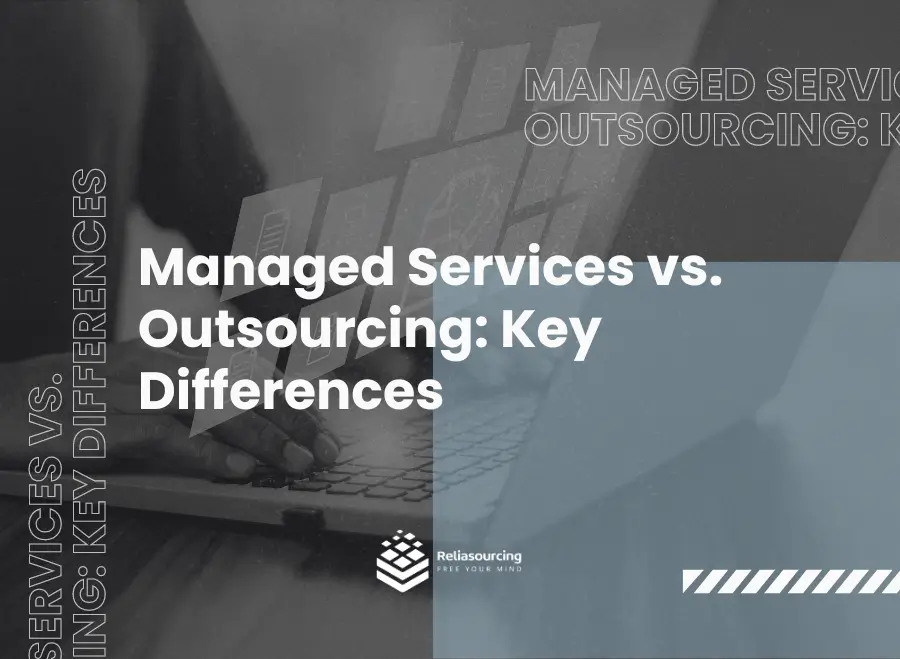A significant strategic choice many companies face is deciding between managed services and outsourcing. While both options can lead to improved performance and cost savings, they each offer distinct approaches and benefits. This comprehensive guide will explore the nuances between managed services vs. outsourcing, shedding light on their respective advantages and helping you determine which solution aligns best with your business needs. Through understanding these differences, you can make an informed decision that optimizes your operations and drives your business forward.
What Are Managed Services?
When discussing managed services vs outsourcing, managed services involve outsourcing responsibilities to maintain and anticipate various processes for better operations and reduced costs. The approach offers significant benefits and enhances operations, especially in IT services, while also helping reduce overall expenses. Managed service providers (MSPs) offer services like network, application, infrastructure, and security through ongoing support and active administration. They also deliver these services on customers’ premises, at their data centers, or at third-party data centers, ensuring comprehensive management.
Key Features of Managed Services
- Proactive Support: Unlike traditional outsourcing, which is often reactive, managed services take a proactive approach to managing IT infrastructure and applications.
- Comprehensive Solutions: MSPs offer a wide range of services, from network monitoring and security management to cloud services and disaster recovery.
- Long-Term Partnership: Managed services are usually provided under a long-term contract, fostering a close partnership between the provider and the client.
- Scalability: Managed services can easily scale up or down based on the client’s needs.
Cases for Managed Services
- Small to Medium Enterprises (SMEs): SMEs can benefit from managed services by gaining access to expert IT support without the overhead costs.
- Enterprises with Complex IT Needs: Businesses with intricate IT environments can use managed services to ensure optimal performance and security.
- Growing Companies: Companies experiencing growth can use managed services to scale their IT infrastructure efficiently.
What Is Outsourcing?
Outsourcing involves hiring a third-party company to handle certain business functions or processes. Most of outsourced services are processed offshore where top outsourcing companies are located in the Philippines, India, and Unlike managed services, which focus primarily on IT functions, outsourcing can cover a broad range of business areas, including customer service, accounting, human resources, and more.
Key Features of Outsourcing
- Task-Specific: Outsourcing typically focuses on specific tasks or processes rather than a holistic approach.
- Flexibility: Contracts can be short-term or long-term, depending on the company’s needs.
- Cost-Saving: Often chosen to reduce operational costs.
Cases for Outsourcing
- Customer Support: Many companies outsource customer service to specialized BPO contact centers.
- Back-Office Functions: Tasks such as data entry, payroll processing, and accounting are commonly outsourced.
- IT Services: While managed services focus on IT infrastructure, outsourcing can cover additional IT functions like software development and maintenance.
The Key Differences Between Managed Services and Outsourcing
While both managed services vs. outsourcing involve working with external organizations, they differ significantly in their scope, approach, and impact on the business.

Managed Services vs. Outsourcing: How to Choose Between Them
Choosing between managed services and outsourcing depends on several factors, including your business needs, budget, and strategic goals.
When to Choose Managed Services
- Need for Comprehensive IT Management: If your business requires ongoing IT support and proactive management, managed services are a better fit.
- Desire for Long-Term Partnership: If you are looking for a long-term, strategic partnership with a provider that understands your business, managed services are ideal.
- Focus on IT Infrastructure: When IT infrastructure and applications are critical to your business operations, managed services can ensure optimal performance and security.
When to Choose Outsourcing
- Specific Task or Process: If you have specific tasks or processes that can be handled externally, outsourcing is a cost-effective solution.
- Short-Term Projects: For short-term projects or seasonal work, outsourcing offers flexibility without long-term commitments.
- Non-Core Functions: When you need to offload non-core functions like customer service or payroll, outsourcing can help you focus on your core business activities.
Key Considerations
- Budget: Determine your budget and evaluate the cost-effectiveness of both options.
- Control: Consider how much control you want to retain over the processes being outsourced or managed.
- Expertise: Assess the level of expertise required and whether it is available in-house or needs to be sourced externally.
- Scalability: Evaluate how scalable each option is based on your business growth projections.
How Reliasourcing Helps with Managed Services
Reliasourcing provides a comprehensive suite of managed services designed to support and enhance your business operations. Here’s how:
- Access to Unique Resources: Gain access to specialized IT resources and knowledge that are often difficult to find. Reliasourcing handles tasks to ensure you have the expertise you need without the struggle of hiring in-house talent.
- Profit-Boosting Cost Savings: Outsourcing to Reliasourcing is more cost-effective than maintaining an in-house IT team, particularly in areas with scarce skill sets like cybersecurity. This can significantly reduce expenses and increase profitability.
- Continuous Support and Upkeep: Benefit from 24/7 support and maintenance, minimizing downtime and ensuring the reliability and accessibility of crucial systems and services.
Learn more about Reliasourcing’s Managed Services.
The Bottom Line
Deciding between managed services and outsourcing depends on your business’s specific needs and strategic goals. Managed services offer a comprehensive, long-term solution for IT management, while outsourcing provides flexibility and cost savings for specific tasks or short-term projects. By understanding the key differences and evaluating your requirements, you can make an informed decision that benefits your business.
At Reliasourcing, we offer both managed services and outsourcing solutions to help you achieve your business objectives. Contact us today to learn more about how we can support your business’s growth and success.
Ready to optimize your business operations with managed services or outsourcing? Contact Reliasourcing today to learn how we can help you achieve your goals and drive your business forward.









